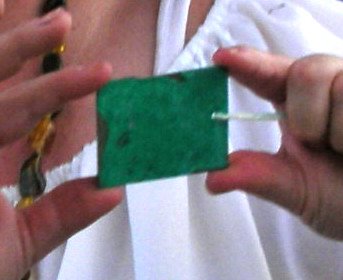Hygiene. Because they had no running water, there was no such thing as flush toilets. Generally sophisticated plumbing facilities were an outhouse built over a cesspit. Those living more comfortably might have a chamber pot which they used in the evening and which would then be emptied into the cesspit in the morning. After defecating, people used hay, straw, grass, or some other vegetation to wipe themselves. Because of a relatively lack of privacy when grooming or attending to basic bodily needs, it appears that people had a higher threshold of embarrassment than modern people. These thresholds also applied to the use of bodily fluids. "Medieval people were not very squeamish about urine: not only was it an essential element in tanning leather and fulling cloth, but the medieval physician's analysis of a patient's urine was expected to take into account taste as well as appearance." (Singman, 50)
http://www.cas.sc.edu/hist/faculty/edwardsk/pubs/dailylife.html
This refers to Jeffrey L. Singman. Daily Life in Medieval Europe. Westport, CN: Greenwood Press, 1999. which I will have to take a look at. Does anyone have it?
Wednesday, July 26, 2006
Evidence Urine was Period!
"Tell me also, to what purpose or end
The genitals were made, that I defend,
And for what benefit was man first wrought?
Trust you right well, they were not made for naught.
Explain who will and argue up and down
That they were made for passing out, as known,
Of urine, and our two belongings small
Were just to tell a female from a male,
And for no other cause- ah, say you no?
Experience knows well it is not so;
And, so the clerics be not with me wroth,
I say now that they have been made for both,
That is to say, for duty and for ease
In getting, when we do not God displease.
Why should men otherwise in their books set
That man shall pay unto his wife his debt?
Now wherewith should he ever make payment,
Except he used his blessed instrument?
Then on a creature were devised these things
For urination and engenderings."
Geoffrey Chaucer, d. 1400:
The genitals were made, that I defend,
And for what benefit was man first wrought?
Trust you right well, they were not made for naught.
Explain who will and argue up and down
That they were made for passing out, as known,
Of urine, and our two belongings small
Were just to tell a female from a male,
And for no other cause- ah, say you no?
Experience knows well it is not so;
And, so the clerics be not with me wroth,
I say now that they have been made for both,
That is to say, for duty and for ease
In getting, when we do not God displease.
Why should men otherwise in their books set
That man shall pay unto his wife his debt?
Now wherewith should he ever make payment,
Except he used his blessed instrument?
Then on a creature were devised these things
For urination and engenderings."
Geoffrey Chaucer, d. 1400:
Canterbury Tales: Prologue to Wife of Bath's Tale [Modern Version]
Subscribe to:
Comments (Atom)
